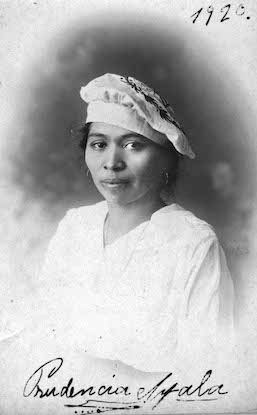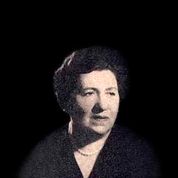This article is adapted from AQ’s special report on closing the gender gap | Leer en español
The 1931 presidential contest in El Salvador is usually remembered for being the first competitive election in the country’s history. The triumph of Arturo Araujo, a prominent landowner, seemed to inaugurate an era of greater democratization. Until it didn’t: After only nine months, a military coup overthrew Araujo and brought El Salvador back to a path of strongmen and repression (including a shocking peasant massacre in 1932), all common features of Central American politics at the time.
However, the 1931 Salvadoran elections were also historic for another, less remembered reason: It was the first time in Latin American history that a woman, Prudencia Ayala, decided to run as a presidential candidate.
It is hard to exaggerate how much Ayala, a writer and one of the most innovative early feminists, was ahead of her time. Her bid for the presidency — which was eventually blocked by the Supreme Court — took place two decades before women were even allowed to vote in El Salvador. Ninety years later, only one other woman has ever run for the highest office in the country.
Ayala had another characteristic that made her stand out in the highly stratified and conservative Salvadoran establishment of the time: She was indigenous — or, in her own words, “proud to be a humble Salvadoran Indian.”

Born in the state of Sonsonate in 1885, Ayala was of working-class origins, largely self-taught as her parents could afford to send her to school only until second grade. At age 10, she moved with her mother to Santa Ana, near the Guatemalan border. The city was an effervescent political hub and home to the so-called unionist movement, which sought to integrate Central American countries into one federation — an idea that she came to enthusiastically embrace. As a young and single mother, Ayala started her writing career in journalism and her criticism of the Salvadoran establishment landed her in prison.
In 1920s El Salvador, women were barred from voting and feminist organizations were incipient. But they found innovative ways to engage in politics, as an infamous episode in 1922 illustrates. On Christmas Day, in the middle of a presidential campaign, a group of women of all ages and social classes marched in San Salvador in support of the opposition candidate. Above all, they called for the end of the dynastic governments headed by the Meléndez-Quiñones family. As a response to the parade, President Jorge Meléndez — the third member of the family to consecutively hold the presidency — unleashed the armed forces and paramilitary groups against the demonstrators, killing several women and injuring many more.
“Ciudadano” is also female
Against this backdrop, by the turn of the decade Ayala had become a well-known figure in the political debate as a prominent advocate of Central American unionism and a critic of U.S. intervention in the region. She was also a strong promoter of women’s rights and greater participation in public affairs. Living in Guatemala, Ayala decided to move from writing to political action: She began planning her presidential candidacy with the support of the Unionist Party.
When launching her bid for the presidency, Ayala developed a 14-point program, emphasizing probity and the fight against corruption. It also included support for workers’ rights and political rights for women, so they could cease to be de facto second-class citizens. She called on women to take part in the campaign, speaking at numerous conferences and giving interviews. Ironically, however, most women seemed to support Araujo, from the Labor Party. Perhaps by departing from dominant women-as-mother views, the challenge to the status quo was too great even for the female electorate. But the press did pay attention. Some journalists acknowledged the justice of her demands, although coverage of her campaign mostly had a sensationalist tone — some nicknamed her “Prudencia, la loca.”
To claim her right to run for president, Ayala appealed to a common argument used by female suffragists at the time: Although formally male in Spanish, the noun “ciudadano” in the constitution was gender-neutral, also applying to women. The Council of Ministers, formed by the government cabinet, rejected this claim, and the Supreme Court reaffirmed the decision based on procedural grounds.
After months campaigning in legal limbo, she finally dropped her candidacy and recognized her defeat, bitterly declaring, “By not being qualified as citizen, I am left without nationality, appearing in the world of men as an inhabitant of planet Earth.”
The “proud Indian”
Ayala’s poor and indigenous background greatly challenged societal norms. In fact, during her campaign she was repeatedly ridiculed, masculinized, her indigenous features exaggerated in comic strips, and shamed for abandoning her rightful place in the home.
But being indigenous also made her unique compared to other women who were fighting for political participation across Latin America at that time. Take, for instance, Matilde Hidalgo de Procel, who in 1924 caught Ecuador’s institutions by surprise when registering to vote. Like Ayala, she claimed the 1906 constitution referred to gender-neutral ciudadanos, which only required being over 21 years old and literate to be able to vote. The local council, not knowing how to reply, elevated the consultation to a national Council of State, which unanimously agreed that there were no legal impediments. Later that year, Hidalgo and a few other women voted in the legislative elections. Hidalgo helped make Ecuador the first country in Latin America to enfranchise women.
Hidalgo represents a more common profile among early feminists in the region. Born into a middle-class liberal family, she circumvented all kinds of barriers to receive a formal education and became the first female physician in Ecuador. Other prominent feminists in the region were also the first women in their respective professional fields. Paulina Luisi, founder of the National Council of Women in 1916 and the leader of the Uruguayan women’s movement, was also the first female doctor in her country. Brazil’s Bertha Lutz, who was instrumental in securing voting rights for women in 1932, was a prominent zoologist and scientist. Both Luisi and Lutz had in common being from European immigrant families. And they also shared the international stage in the Pan-American context, where many women came together in a transnational feminist movement.
Ayala was born poor, non-white and never received higher education. Despite her championing the cause of Central American unionism, she lacked the international networks of her fellow Brazilian and Uruguayan feminists. In many ways, Prudencia Ayala was the exception among these exceptional women.
The last barrier to fall
Despite the actions of Ayala, Hidalgo, Luisi, Lutz and many other Latin American women, extending political participation, including voting rights, to female citizens was generally resisted by male elites. Some men feared political participation would remove women from their “rightful place” (the home and the family). Others thought women would vote en masse for their opponents. Therefore, powerful political parties kept delaying suffrage extensions and most Latin American countries only enfranchised women in the decade following the end of World War II.
“The field of action of women is in the home. The function that nature has commended her is a strictly conservative function: conservation of the species, of the home, of the family and its traditions,” claimed Peruvian legislator Manuel Bustamante de la Fuente when voting against women’s suffrage in a failed reform attempt in 1931. On the other side of the political spectrum, Luis Alberto Sánchez of the APRA party said the proposal to enfranchise women responded to “the fundamental need to prop up with a strong contingent of feminine voters the subsistence and entrenchment of the ideals and aspirations of the conservative spirit.” These common arguments point to the obstacles faced by Latin American suffragists.
When it finally came, change was slow, as other formal and informal limitations remained in place. Countries like Brazil, Peru and Guatemala kept literacy requirements for voting — which disproportionately affected indigenous and Afro-descendant women from rural areas.
In other words, women with a similar background to Prudencia Ayala were the last citizens allowed to vote in Latin America. Only when Brazil ended the restriction for illiterate people to vote in 1985 — 54 years after the Ayala campaign in El Salvador — did formal constraints on women’s suffrage end in the region.
Ayala would not come to exercise the right to vote and she would never see other women run for office in her home country. When leaving the campaign in 1930, she stated, “I depart grateful of the politicians that have paid attention to the justice I demand from the law. ... Joy seizes my hope in the next electoral future.” However, as El Salvador descended again into authoritarianism, the limits to her political activities increased. The causes of Ayala’s premature death in 1936 remain uncertain. She was then ignored or erased from history books for decades, only to be reclaimed more recently by feminist movements in El Salvador and beyond as a symbol of freedom, justice and endurance.
__
Castillo is a researcher at the Center for the Study of Political History at Adolfo Ibáñez University
Tags: El Salvador, Gender, politics, The Long View

)








